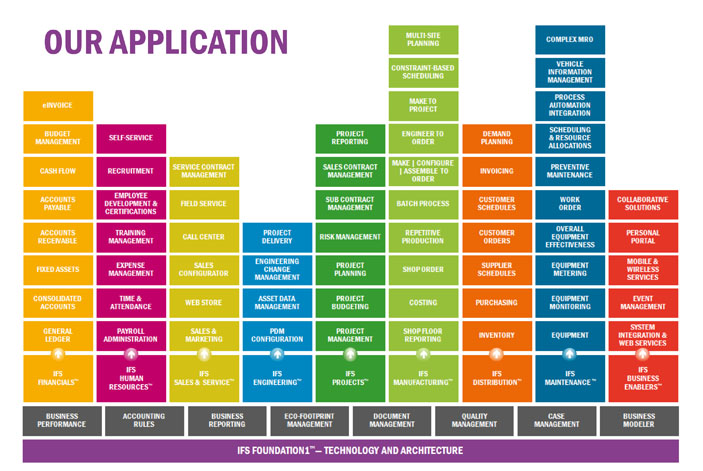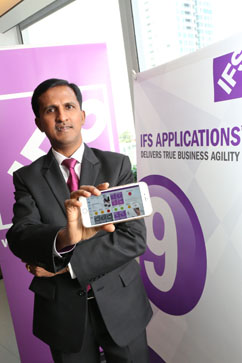SOME 60% of the world’s population live in Asia.
Yet, when it comes to embracing Enterprise Resource Planning (ERP), less than 7% of its implementations are in developing countries in Asia*.
This is a fact borne out by IFS, a company that has one million users worldwide, of which only 50,000 are in Asia. The Swedish provider of ERP software is one of several players like SAP, Oracle and PeopleSoft, that has waded into the business of providing management solutions in the computer era.
ERP’s benefits include improving efficiency, automating aspects of the business that ensure things run smoothly, and forecasting. There is a long list of services that is added to this menu of offerings on an ongoing basis.
The downside of ERP is the challenge in customizing the software for various companies in Asia. Given the Western-centric nature of ERP solutions, companies in other regions find it challenging to cope with the way the system is configured.
A Modular Approach
To help bridge this divide, IFS uses its modular approach to either introduce companies to ERP or to incorporate it into their existing architecture.

Sridharan Arumugam, Vice-President, Southeast Asia of IFS, likens it to a Lego set. “It is a huge system with more than 60 modules,” he explains.
As he points to a powerpoint presentation showing the various rows and columns which allow customers to pick and choose their ERP needs, he’s also cognizant of the potential Asia offers to the brand.
With 5% of the reach in a continent that has the bulk of the population and shows the greatest growth opportunities, there’s a huge upside potential.
Niche Industries
In terrain where SAP and Oracle are brands that are often heard, IFS is little known, at least to the public. IFS operates in niche industries, where its capabilities are well known.
Oil and gas is an area where IFS has a strong hold. Soon, by virtue of its acquisition of Canadian company Mxi Technologies, last October, it will strengthen its presence in the global aviation industry.
Tail planning optimization, which lets airlines maximize the efficiency of their fleet, is not offered by any of IFS’s competitors. Previously, this complex and vital aspect of the business was done manually. With Mxi’s complementary intelligent maintenance management software solutions, IFS’s reach has grown significantly.
“This acquisition strengthens our position and gives us a leading position,” says Sridharan, who is also keeping an eye on the growing defence, oil and gas, and automobile industries in the region.
Human Interphase

With the expanding reach of the Internet and technology, it’s only inevitable that the Internet Of Things (IOT) would become an important aspect of the ERP solution.
“We have an IFS lab in Sweden and a research and development facility in Sri Lanka, where there are several things around IOT being planned. The availability of cheap sensors and their ability to transfer data automatically with IOT makes for greater efficiency and minimises errors,” says Sridharan.
This would ensure less manual checking and human interaction where errors due to inputting mistakes or procrastination are virtually eliminated.
One of the keys to making its services palatable to a younger audience is diminishing the difference between work and play.
“Version 9 of our software, which was launched in 2015, makes it easier for users to understand how to get the most out of it,” says Sridharan.
Seamless Use
“When we buy mobile phones, it doesn’t come with a user manual. With IFS, you can use it without a user manual. It’s very simple. It’s like Google search,” explains Sridharan.
“This is a critical tool in digital transformation as it makes it easy to use. I can use it on all my devices. When I’m in the airport, I can look at reports, approve invoices. They don’t have to wait for me to come back to the office after one week.
“These days, people are very pampered. They are spoon-fed the information — to your phone, watch and wearables,” Sridharan says.
Avoiding The Old Methods
Having worked through the old system, Sridharan has seen the benefit of what he is selling.
“I started my career as an engineer in a cement plant. I used to go and measure oil level and vibration levels, on a daily basis, as it was an important function.
These days, that can be done by the ERP system, which can make decisions for the good of the operation. It can suggest fixes and even show you how they can be done.”
That frees management up to make larger decisions for the business.
In an era of disruptions and constant change, Sridharan reckons that ERP can help businesses manage sudden shifts. “Once you map the processes, they can be managed. But the big challenge is that companies are not ready with their systems.
“If they don’t configure it, they will not be able to handle disruptions. Our lab is constantly bringing in new tools. We’ve been learning from Europe’s experiences, and since Asia lags behind, we can implement solutions to soften the blow.”
The biggest challenge now is to get the businesses in Asia to embrace ERP and all that it has to offer, and for ERP providers to understand what Asia needs to be relevant.
*ERP Adoption in Developing Countries in Asia: A Cultural Misfit by Jayantha Rajapakse and Peter B Seddon, Department of Information Systems, The University of Melbourne, Australia.
You might also like to read:




















